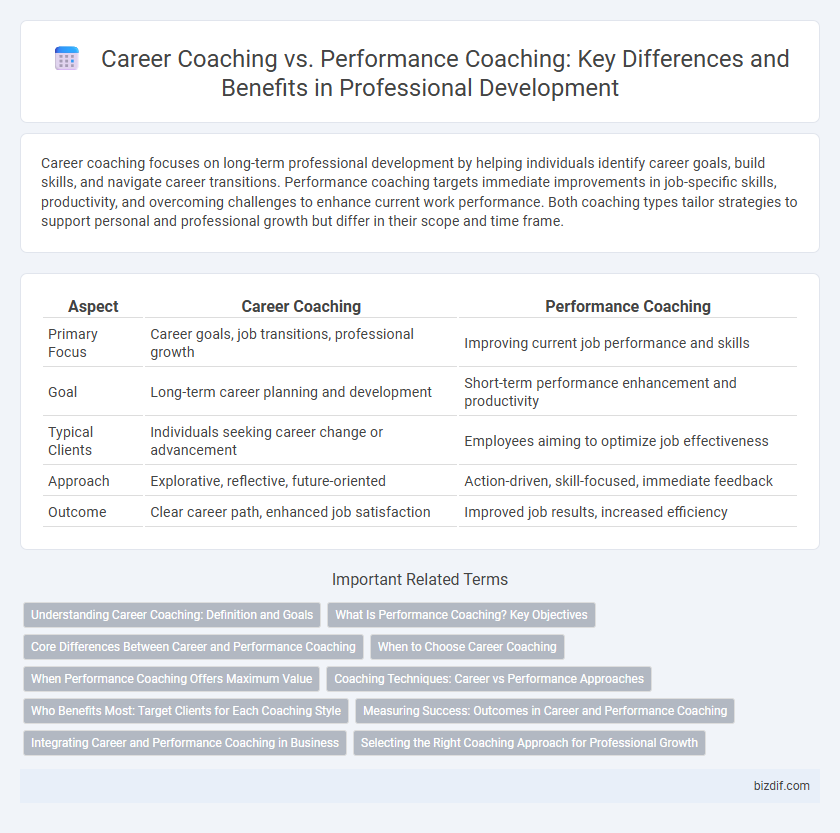Career coaching focuses on long-term professional development by helping individuals identify career goals, build skills, and navigate career transitions. Performance coaching targets immediate improvements in job-specific skills, productivity, and overcoming challenges to enhance current work performance. Both coaching types tailor strategies to support personal and professional growth but differ in their scope and time frame.
Table of Comparison
| Aspect | Career Coaching | Performance Coaching |
|---|---|---|
| Primary Focus | Career goals, job transitions, professional growth | Improving current job performance and skills |
| Goal | Long-term career planning and development | Short-term performance enhancement and productivity |
| Typical Clients | Individuals seeking career change or advancement | Employees aiming to optimize job effectiveness |
| Approach | Explorative, reflective, future-oriented | Action-driven, skill-focused, immediate feedback |
| Outcome | Clear career path, enhanced job satisfaction | Improved job results, increased efficiency |
Understanding Career Coaching: Definition and Goals
Career coaching focuses on helping individuals identify their professional goals, clarify career paths, and develop strategies to achieve long-term success and satisfaction. It involves assessing strengths, values, and interests to align career choices with personal aspirations and market opportunities. Unlike performance coaching, which targets improving current job performance, career coaching emphasizes future-oriented development and holistic growth.
What Is Performance Coaching? Key Objectives
Performance coaching targets improving specific skills and behaviors to enhance job effectiveness, focusing on measurable outcomes such as productivity, quality, and goal achievement. Key objectives include identifying performance gaps, developing actionable improvement plans, and providing ongoing feedback to foster skill development and accountability. This approach is results-driven, aiming to boost employee performance and contribute directly to organizational success.
Core Differences Between Career and Performance Coaching
Career coaching centers on guiding individuals through job transitions, skill development, and long-term professional goals, enhancing overall career satisfaction and growth opportunities. Performance coaching targets improving specific job-related skills, productivity, and workplace behaviors to achieve immediate organizational objectives and personal effectiveness. Core differences lie in career coaching's broader strategic focus versus performance coaching's tactical emphasis on current performance metrics and skill enhancement.
When to Choose Career Coaching
Career coaching is ideal when individuals seek guidance on long-term professional goals, career transitions, or identifying suitable industries and roles. This coaching focuses on exploring personal interests, values, and skills to align with fulfilling career paths. Choosing career coaching is essential during periods of job dissatisfaction, graduation, or when considering a significant change in career direction.
When Performance Coaching Offers Maximum Value
Performance coaching offers maximum value when employees face specific skill gaps, tight deadlines, or measurable productivity goals, enabling rapid improvement and tangible results. It targets enhancing job performance through individualized feedback, skill development, and real-time problem-solving, making it crucial in roles with clear performance metrics. Unlike career coaching, which focuses on long-term growth, performance coaching drives immediate impact in workplace effectiveness and team output.
Coaching Techniques: Career vs Performance Approaches
Career coaching techniques emphasize goal setting, self-assessment, and exploration of values to align clients' professional paths with their personal aspirations. Performance coaching focuses on skill development, feedback mechanisms, and behavior modification to enhance job effectiveness and productivity. Both approaches utilize active listening and motivational strategies but differ in scope: career coaching targets long-term career growth, while performance coaching addresses immediate work performance improvements.
Who Benefits Most: Target Clients for Each Coaching Style
Career coaching primarily benefits individuals seeking guidance on career transitions, job searches, or professional development, including recent graduates, career changers, and professionals aiming for advancement. Performance coaching targets employees and executives looking to enhance specific skills, improve workplace productivity, and achieve measurable results within their current roles. Organizations invest in performance coaching to boost team effectiveness and leadership capabilities, while career coaching is often sought by those at career crossroads or entering the workforce.
Measuring Success: Outcomes in Career and Performance Coaching
Measuring success in career coaching primarily involves tracking metrics such as job satisfaction, role alignment, and achievement of long-term career goals. Performance coaching success is often assessed through improved productivity, skill development, and attainment of specific performance targets. Both coaching types use feedback tools and progress evaluations, but career coaching emphasizes personal fulfillment while performance coaching focuses on enhancing workplace efficiency.
Integrating Career and Performance Coaching in Business
Integrating career coaching and performance coaching within business strategies enhances employee development by aligning individual career goals with organizational performance objectives. This approach fosters continuous skill growth and motivation, driving both personal career advancement and measurable business outcomes. Leveraging tools like 360-degree feedback and personalized development plans ensures a cohesive framework that supports long-term workforce engagement and productivity.
Selecting the Right Coaching Approach for Professional Growth
Career coaching targets long-term professional goals by helping individuals identify strengths, clarify career paths, and develop strategic plans for advancement. Performance coaching centers on improving specific skills and productivity within current roles to enhance immediate job effectiveness and achieve measurable results. Selecting the right coaching approach depends on whether the priority is overall career development or immediate skill enhancement to drive professional growth.
Career coaching vs performance coaching Infographic

 bizdif.com
bizdif.com